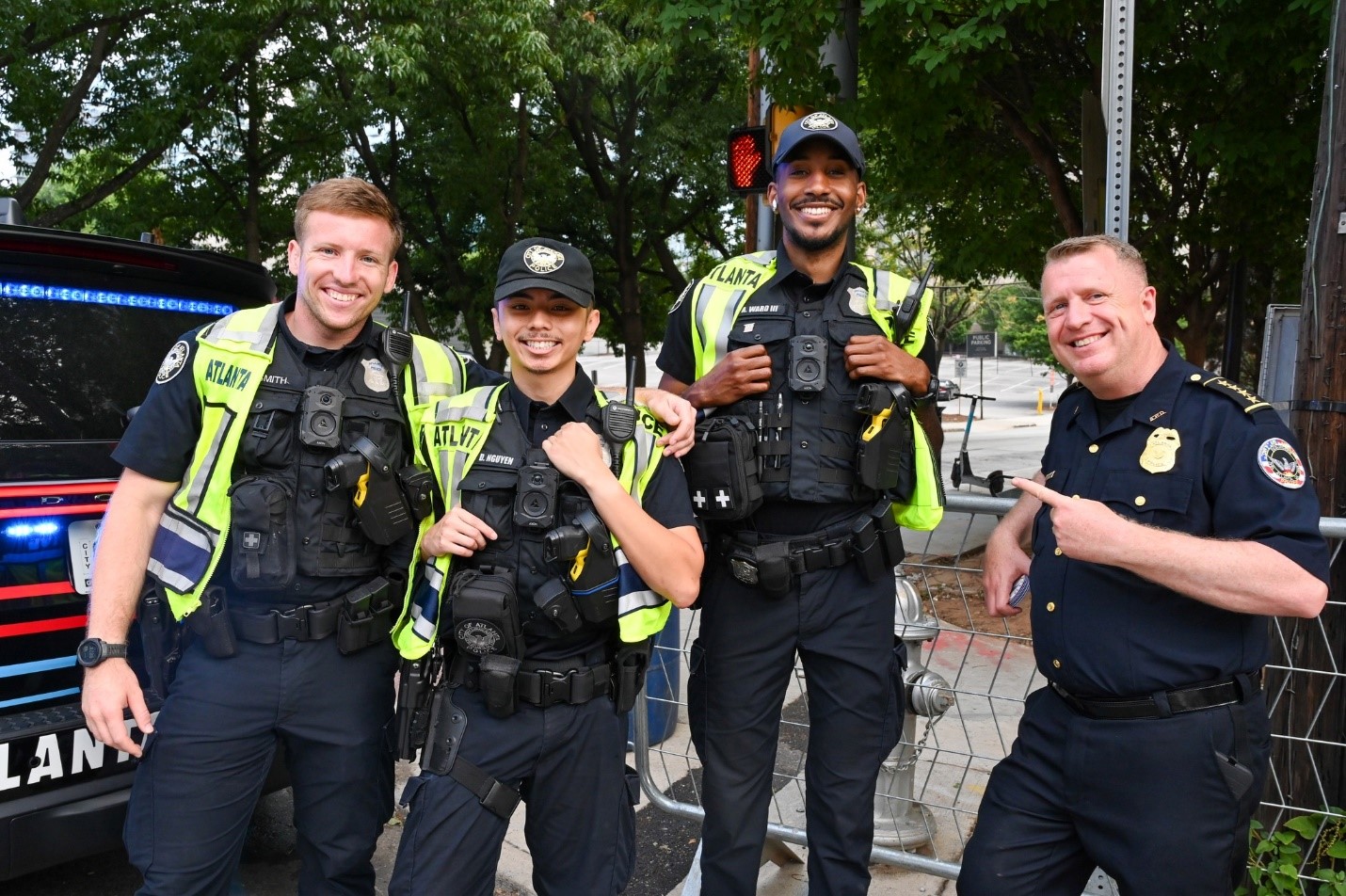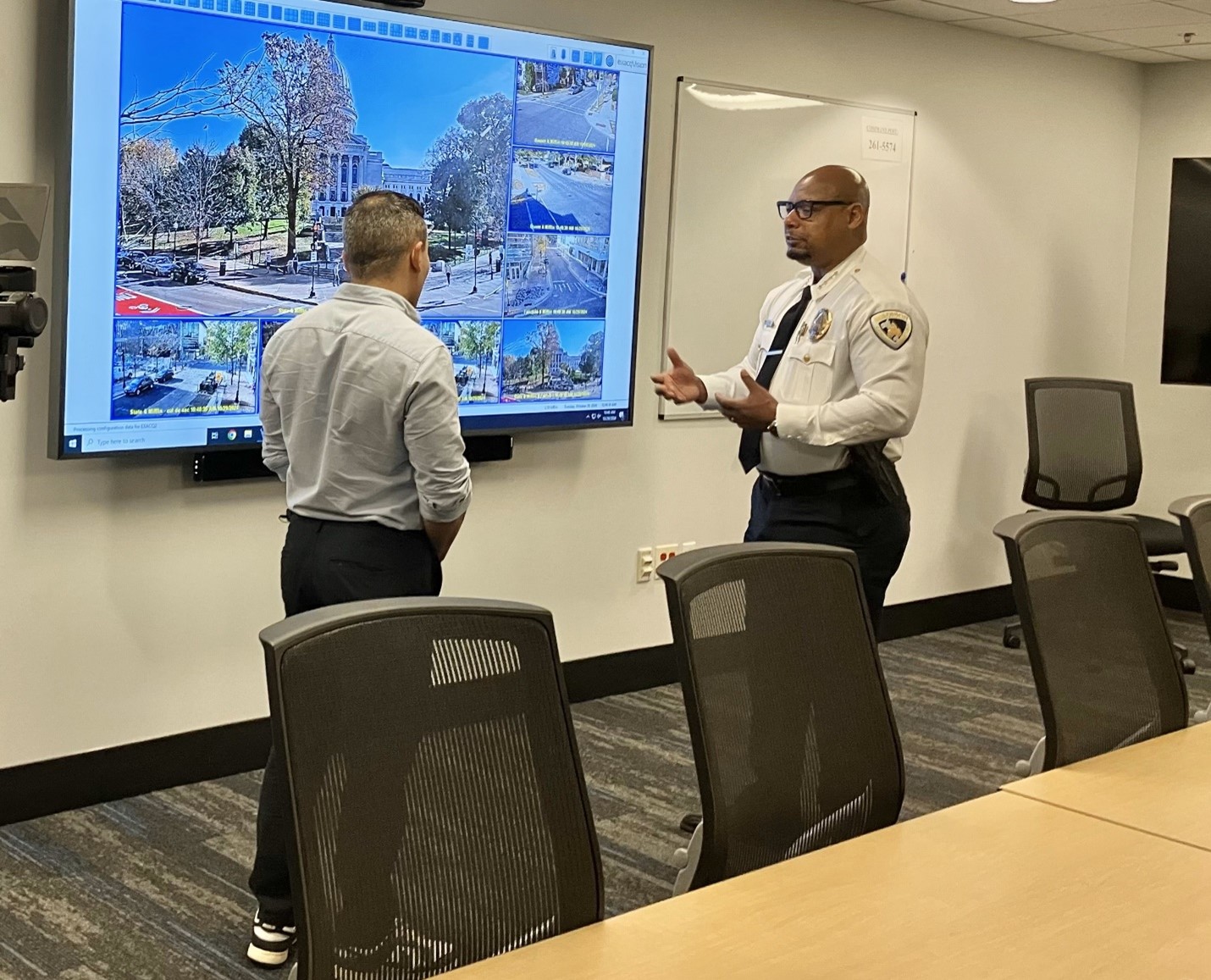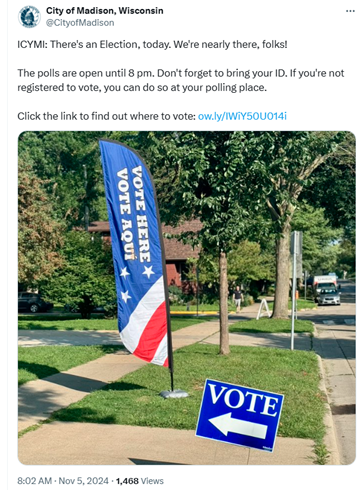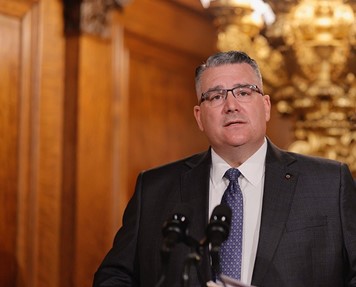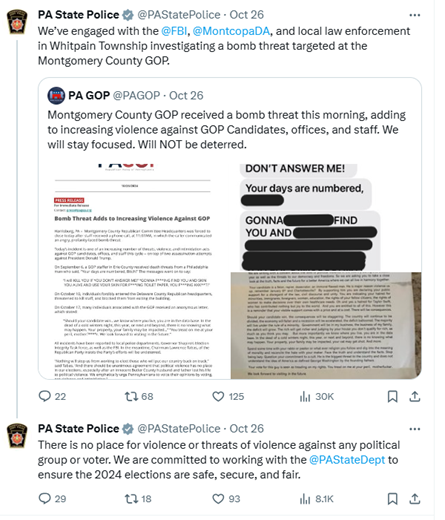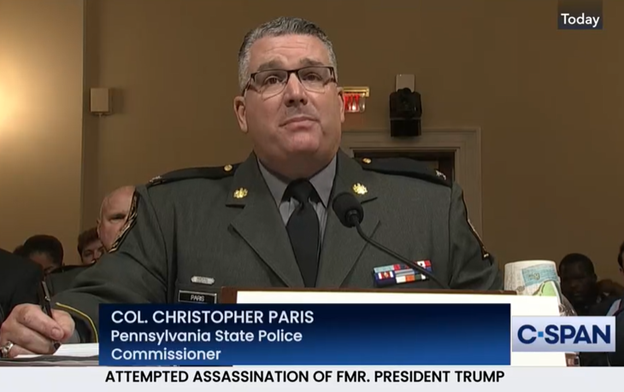|
November 9, 2024 Police leaders from battleground states help protect the election process
PERF members, Over the past several years, American police chiefs and sheriffs have been preparing for the 2024 election. After the 2020 election, we saw protests and disputes over the election results in some battleground states, an effort that culminated in the insurrection attempt at the U.S. Capitol on January 6, 2021. After that experience, as well as the two assassination attempts on former and future President Trump this summer, police leaders had concerns about how the electoral process might unfold this year and spent a substantial amount of time preparing for various possible scenarios. At our Town Hall Meeting in Boston three weeks ago, we heard from FBI Director Christopher Wray, Acting U.S. Secret Service Director Ronald Rowe, U.S. Capitol Police Chief Tom Manger, and local police chiefs about their preparations for the election. Fortunately, Election Day generally transpired smoothly, though law enforcement in several states dealt with bomb threats that the FBI says appear to have originated from Russia, and it seems that all sides will accept the election results this year. On Wednesday and Thursday following the election, I spoke with three police officials from swing states – Atlanta Chief Darin Schierbaum, Madison Chief Shon Barnes, and Pennsylvania State Police Commissioner Christopher Paris – to hear about their Election Day experiences. Atlanta Chief Darin Schierbaum Chuck Wexler: It’s the day after the election. Are you feeling exhausted? How late were you up last night? Chief Schierbaum: I was up until just about 1 a.m. this morning. We were actually able to shut our Joint Operations Center down at 10 p.m. The groups we normally have issues with were not coming out. They weren’t posting and they weren’t mobilizing, and the margin in the state was such that we knew we were not going to have any issues at any of the tabulation centers. So we were able to start demobilizing and send all the state resources home at 10 p.m. I stayed awake just to make sure we didn’t miss anything. Wexler: Looking back at the lead-up to the election, how did you manage all the campaign visits? Chief Schierbaum: From January up until Election Day this year, we had 40 visits either by the candidates themselves or surrogates or individuals with a certain level of Secret Service protection, such as former presidents, former first ladies, spouses, running mates, and running mates’ spouses. Some of those just touched us briefly at our airport, but we still had to secure the airport. Some were overnight stays that took a substantial amount of police resources to make sure those events were safe and anyone wanting to protest had a safe environment to protest. We have a great working relationship with the Secret Service and other agencies in the region. When we do have a candidate visit, we get assistance from the Georgia State Patrol and our sheriff in Fulton County. We rarely did it alone.
Chief Schierbaum (right) with Atlanta officers protecting the Peachtree Road Race in July. Source: Atlanta Police Department on Facebook Wexler: How much notice do you receive when a candidate visits? Chief Schierbaum: It’s usually a very short window. We’re fortunate when we have a week, and it’s a miracle when we have two weeks. Sometimes it’s 48-72 hours. So at all times, we maintain knowledge of what resources we have in place, and we have level activation. A Level 1 activation would be just reallocating the resources currently on duty. Level 2 would start moving individuals away from certain duties, such as administrative or investigative duties. So we have tiered activation to match what we believe the resource needs will be for that event. And all our planning has a two-point focus: protect the event and continue to fight crime in Atlanta. Wexler: Yesterday you experienced bomb threats that originated from Russia. Were you prepared for that? Chief Schierbaum: We had prepared for that. The responsibility for safe elections lies with the counties, and Atlanta sits in two counties: Fulton and DeKalb. We work very closely with Sheriff Patrick Labat and Police Chief Wade Yates in Fulton County and Sheriff Melody Maddox in DeKalb County. We all assessed what we thought were likely scenarios on Election Day, and bomb threats to polling stations was one of the scenarios, as was swatting at a precinct. There was either a police officer or sheriff’s deputy staged at all 87 polling stations inside the city limits, and that was also the case for all precincts in Fulton County. So for any call coming in about a polling location, we would immediately check with the officer there to make sure a swatting call couldn’t stop the voting. But it turned out there weren’t any swatting calls. A lot of bomb threats came in. There were over 30 bomb threats in Fulton County, and about eight were inside city limits. When the first couple of threats came in, they did pause voting. Then once the FBI informed us that these were primarily originating from Russia, the plan was for the officer present and another officer to walk through each facility that was threatened. We also had 19 canines distributed throughout the city. Those canines were ready to go in and clear out any suspicious device or package detected on the walk-through. We only had to use that one time to make sure a building was safe at a precinct on the Emory University campus. By adopting that process early in the day, thanks to the information provided to us by the FBI, we were able to address those calls without stopping the voting process. We were also aware of the hubs where every ballot would go before being taken to the tabulation center. We assessed the security of those locations and had police officers there. The camera systems were fully vetted, and where we thought we had deficiencies, we deployed camera trailers. We were watching the movement of the ballots through Fulton County and the city of Atlanta, and we could readjust our resources as we tried to anticipate where a protest could occur that would stop or slow the counting process. I want to commend Chief Yates, Sheriff Labat, and Sheriff Maddox, who were all phenomenal partners as we planned far in advance and leveraged all our resources to make sure we got through the day safely. And a lot of the things we anticipated didn’t materialize. We didn’t get a militia showing up. We did not get large protests at the tabulation centers. But we had a plan for that in case it happened. Wexler: Is there anything else you’d like to share with PERF’s membership? Chief Schierbaum: Tabletops are vital. Get everyone in a room and walk through the various scenarios that could play out. Information that we weren’t aware of, but our county partners were aware of, came to light during those tabletops. Collaborate early, plan early, tabletop early, and have enough depth on the bench to be flexible. You could tabletop seven scenarios, but the eighth one you didn’t think of happens. Your resources have to be deep and dispersed so they can respond to the unexpected. And I saw a bipartisan approach in Georgia to make sure we had a day where democracy played out. I couldn’t be prouder of our state and regional partners, whether they are led by Democrats or Republicans. I think you saw the best of American law enforcement at play yesterday to make sure we had the safe ability to vote in Atlanta. Madison Chief Shon Barnes Chuck Wexler: What were you concerned about before the election, and do you think your preparations helped keep everything running smoothly? Chief Barnes: We were concerned about what we saw in 2020, which was a recount in the state of Wisconsin that primarily occurred in the capital and was contentious. People believed there were things going on that would not lead to the Democratic Party winning Wisconsin, which it did that year. So we went through a serious process of voter recount. We’ve been preparing for the events of the election for almost a year, and we’ve had several roundtable exercises addressing myriad scenarios and believe it paid a lot of dividends. Yesterday we were able to get in front of any issues and have a smooth Election Day.
Chief Barnes discusses pre-election safety preparations. Wexler: And you got bomb threats that originated from Russia, right? Chief Barnes: We had four locations receive bomb threats, and prior to that, we had another three threats related to schools. In some states, schools are used as polling places. We don’t do that here in Madison, but I believe those threats were related. I think we were able to get ahead of it because of a lot of coordination. As the FBI director said at the PERF Town Hall, their role is to find the origin of the threats, and our role is to respond to them. That worked seamlessly. We had information from our FBI resources that those threats originated in another country, specifically Russia, and we were able to respond without creating any panic. And we knew where our polling locations were and had officers visibly patrolling there before they opened, so we understood the probability that someone placed incendiary devices there was relatively low. Wexler: You had candidates coming in and out of Wisconsin multiple times. Was that a challenge? Chief Barnes: For the first time in many years, the police chief had to cancel days off. That’s something we don’t normally have to do here in Madison and, as you can imagine, it didn’t make me popular with some people. But when everyone came to work and got their assignments, they realized the brevity of the assignment. And they realized how important it was to get people in and out. We had one candidate spend the night, which was a 48-hour operational plan. That candidate came back the next day for a motorcade to another city. We have an airport, and there are many areas of the state that candidates have to motorcade to, because their planes are too big to land in some of the smaller cities. So that has kept us really involved with both candidates for the last two months.
A Tuesday morning post from the City of Madison with election information. Source: City of Madison on X Wexler: What are the lessons learned that you’d like to share with other police chiefs? Chief Barnes: It’s never too early to start preparing and establishing relationships. If you know you’re in a city that’s going to see a lot of activity, you have a responsibility to add to your toolbox through connections with your fusion center, or the Department of Homeland Security, or your local intelligence group. There are resources out there for you. Second, you have to be specific about the training you offer. We offered a roll call – or what we call a “briefing” – training, which is a 15-minute micro-training for officers who would be working that day. That includes who to contact if you’re called to a poll, what to ask for, and what your job is. We also provided de-escalation training to poll workers, and they were very excited about that. We borrowed some things from ICAT. For example, we talked about identifying who is the best person to talk, and that might sometimes mean switching who talks. We also talked about having a lighter touch, which means that our supervisors know that their responsibility is to respond first. This isn’t the time for the rookie officer, even though they might be trained and ready, to be talking to election officials. We would want a supervisor to do that. And we had a communications plan. Our public information officer was in our command center, and I published a blog post Monday talking about civility, what we expect, and letting the community know that we had a plan. If you’re the chief of police, people want to know where you stand and how you’re going to proactively keep them safe, not just how you’re going to respond. I got calls from business leaders in the community asking if they should board their windows up. Because of my communication, we had no windows boarded up in Madison. My last point is to consider officer wellness as part of your planning. Think about officers who may be living in a house divided, where one spouse or partner’s candidate will lose and the other will win. Think about officers who will be voting, and encourage them to take advantage of early voting so that on Election Day they can concentrate on the job you have for them to do instead of getting home quickly to vote. And always give your officers an opportunity to speak. Give them an opportunity to talk about what will be a transfer of power. Pennsylvania State Police Commissioner Christopher Paris Chuck Wexler: Pennsylvania was a crucial state for the presidential election, which must’ve meant the Pennsylvania State Police (PSP) had a lot of responsibility. Tell me about your role during the lead-up to this election. Commissioner Paris: I think PSP is the 10th largest agency in the United States. We have 4,841 enlisted. With civilians, we’re probably up over 6,500. Pennsylvania has about 1,100 municipal agencies. So we see ourselves as not only the primary police for about 80 percent of the geography, where those municipal agencies don’t have a footprint, but also as a partner for those agencies that are well-staffed and well-trained on investigative services, aviation services, accident reconstruction, and criminal intelligence. We tried to leverage those partnerships we rely upon every day to confront the public safety challenges we faced as we headed into the election. Our final tally is around 180 details with the Secret Service. In an average year, we probably have about 25 Secret Service details. Each one requires outreach from the Secret Service. The timelines are always condensed and changing. You generally have a shorter timeline than you would prefer, but that’s dictated by the campaign and the operating environment. Each one needs an operations plan and collaboration. The Secret Service leads the unified command, but we see ourselves as an integral partner and a force multiplier that the Secret Service needs when they’re doing one of these campaign events or visits. The number of troopers necessary to pull events off successfully sometimes ran north of 200 or 250 when we had a bus tour, where they flew into Location A, then took a bus tour to Locations B, C, D, and E, then went to another airport to fly off. It was really challenging for our people, and I can’t say enough about the women and men of the State Police.
Commissioner Paris speaks at the June bill signing event for a new state law banning cell phone use while driving. Source: Pennsylvania State Police on Instagram Wexler: What can you tell me about the role your agency played after the July 13 attempted assassination of former and future President Trump? Commissioner Paris: The State Police played a role in the investigation of any culpability under state law for the three Pennsylvanians who were shot, one of whom was tragically killed. And we did the use-of-force investigation for the Secret Service agent who took out Mr. Crooks after he fired on the venue. The parallel joint investigation continues. The FBI maintains the lead for the investigation of the criminal act of an assassination attempt of a former president. We try to encourage and enhance these close partnerships with the FBI and local Pennsylvania agencies. Ten days after the assassination attempt, I testified before the House Committee on Homeland Security. Wexler: And what about the bomb threats on Election Day? Commissioner Paris: It was probably about an hour before the polls closed, and in Pennsylvania, they close at 2000 hours Eastern Standard Time. It occurred in multiple locations around the Commonwealth. I believe there were eight locations in Philadelphia, which I spoke with Commissioner Kevin Bethel about and were handled by his agency, and also in very rural areas of the state. They occurred in 25 counties, but several of those counties had multiple locations. So I haven’t seen a final tabulation, but a reasonable estimate is close to 50 or more bomb threats. The moment the threats came in, we tried to coordinate as best we could. We got bomb dogs out there. We got search teams out there. Governor Shapiro held a press briefing right after the polls close to encourage people still in line to vote to remain in line, and make everyone aware that we had spoken to our FBI counterparts, and the preliminary investigation showed it was a foreign actor, possibly from Russia. But, from a public safety standpoint, we would never come out and say we had it all sewn up and would ignore whatever else came in.
The Pennsylvania State Police updates the public on a bomb threat directed at a county GOP office two weeks ago. Source: Pennsylvania State Police on X Wexler: You must have felt some pressure to be policing in a state that was so central to the election outcome. Commissioner Paris: There were a couple sleepless nights. My goal was that the Pennsylvania State Police not be perceived in any way, shape, or form as having any impact on the election, other than by ensuring public safety. There were a lot of conversations and meetings with the Pennsylvania Department of State and the Attorney General’s Office. We had information to educate or reemphasize election law to our troopers on patrol and supervisors. For example, in Pennsylvania, a uniformed police officer can’t be within 100 feet of a polling place unless a call for service is occurring or they’re in the act of voting. I would like to think that citizens all across the United States would see a member of law enforcement in uniform and feel good about their presence. But we can’t be tone deaf to the fact that there’s a narrative out there that would see a police officer or marked car in the area as trying to advance an agenda in some way. We wanted to stay away from that and call balls and strikes if we were called in. We had a couple disorderly conduct situations. I was briefed on one situation where somebody was a little boisterous at a polling place. They subsequently voted without incident and left just as our troopers were arriving. We wanted to make sure that if there were any hard calls to make, our troopers and supervisors would call the command post and describe the real-time facts and circumstances to attorneys from the Attorney General’s Office or our chief counsel’s office. We wanted to make sure we were 100 percent on solid ground with election law and any criminal code violations that may or may not have occurred.
Commissioner Paris testifies before Congress regarding the attempted assassination of former and future President Trump in Butler, PA. Source: C-SPAN Thanks to all three police officials for taking the time to speak with me and share their lessons learned with our members. I’m grateful to all the law enforcement leaders who prepared to address potential threats to this election, as one of those threats – bomb threats from foreign actors directed at polling locations – did occur. Had law enforcement not been prepared, polling places could have been shut down and panic, confusion, and even civil disturbances could have ensued. Instead, federal, state, and local law enforcement were able to secure polling locations without disrupting the democratic process. I am thankful for all law enforcement leaders and officers who ensure public safety during some of the most consequential moments of our lives, including on Election Day this past Tuesday! Best, Chuck |

